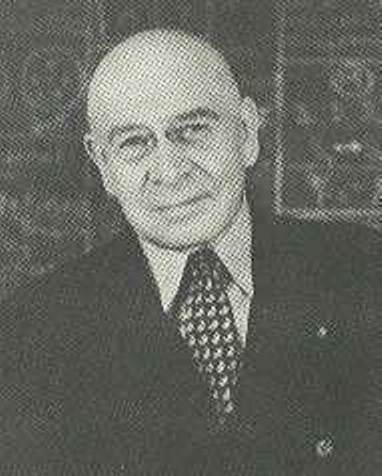The word is not the thing. (ang.)
Źródło: Science and Sanity (1933)
Alfred Korzybski słynne cytaty
„Człowiek może zostać, dosłownie, zatruty przez fałszywe pojęcia i fałszywe nauczanie.”
Humans can be literally poisoned by false ideas and false teachings. (ang.)
Źródło: Manhood of Humanity. The Science and Art of Human Engineering (1921)
There are two ways to slide easily through life: Namely, to believe everything, or to doubt everything; both ways save us from thinking. (ang.)
Źródło: Manhood of Humanity http://www.gutenberg.org/etext/25457, Nowy Jork 1921, s. 4
Alfred Korzybski: Cytaty po angielsku
Źródło: Science and Sanity (1933), p. 64.
Kontekst: Any organism must be treated as-a-whole; in other words, that an organism is not an algebraic sum, a linear function of its elements, but always more than that. It is seemingly little realized, at present, that this simple and innocent-looking statement involves a full structural revision of our language...
Źródło: Science and Sanity (1933), p. 20.
Kontekst: The only link between the verbal and objective world is exclusively structural, necessitating the conclusion that the only content of all "knowledge" is structural. Now structure can be considered as a complex of relations, and ultimately as multi-dimensional order. From this point of view, all language can be considered as names for unspeakable entities on the objective level, be it things or feelings, or as names of relations. In fact... we find that an object represents an abstraction of a low order produced by our nervous system as the result of a sub-microscopic events acting as stimuli upon the nervous system.
“Whatever you might say the object "is", well it is not.”
Źródło: Science and Sanity (1933), p. 35.
Kontekst: "Say whatever you choose about the object, and whatever you might say is not it." Or, in other wordsː "Whatever you might say the object "is", well it is not." This negative statement is final, because it is negative.
Źródło: Manhood of Humanity (1921), p. 133. Chapter: Capitalistic Era.
Kontekst: To regard human beings as tools — as instruments — for the use of other human beings is not only unscientific but it is repugnant, stupid and short sighted. Tools are made by man but have not the autonomy of their maker — they have not man's time-binding capacity for initiation, for self-direction, and self-improvement.
Źródło: Manhood of Humanity (1921), p. 136. Chapter: Capitalistic Era.
Kontekst: Such as contribute most to human progress and human enlightenment — men like Gutenberg, Copernicus, Newton, Leibnitz, Watts, Franklin, Mendeleieff, Pasteur, Sklodowska-Curie, Edison, Steinmetz, Loeb, Dewey, Keyser, Whitehead, Russell, Poincaré, William Benjamin Smith, Gibbs, Einstein, and many others — consume no more bread than the simplest of their fellow mortals. Indeed such men are often in want. How many a genius has perished inarticulate because unable to stand the strain of social conditions where animal standards prevail and "survival of the fittest" means, not survival of the "fittest in time-binding capacity," but survival of the strongest in ruthlessness and guile — in space-binding competition!
“Humans can be literally poisoned by false ideas and false teachings.”
Źródło: Manhood of Humanity (1921), p. 71. Chapter: What is Man?
Kontekst: Humans can be literally poisoned by false ideas and false teachings. Many people have a just horror at the thought of putting poison into tea or coffee, but seem unable to realize that, when they teach false ideas and false doctrines, they are poisoning the time-binding capacity of their fellow men and women. One has to stop and think! There is nothing mystical about the fact that ideas and words are energies which powerfully affect the physico-chemical base of our time-binding activities. Humans are thus made untrue to "human nature." … The conception of man as a mixture of animal and supernatural has for ages kept human beings under the deadly spell of the suggestion that, animal selfishness and animal greediness are their essential character, and the spell has operated to suppress their REAL HUMAN NATURE and to prevent it from expressing itself naturally and freely.
Źródło: Science and Sanity (1933), p. 20.
Kontekst: The only link between the verbal and objective world is exclusively structural, necessitating the conclusion that the only content of all "knowledge" is structural. Now structure can be considered as a complex of relations, and ultimately as multi-dimensional order. From this point of view, all language can be considered as names for unspeakable entities on the objective level, be it things or feelings, or as names of relations. In fact... we find that an object represents an abstraction of a low order produced by our nervous system as the result of a sub-microscopic events acting as stimuli upon the nervous system.
Źródło: Science and Sanity: An Introduction to Non-Aristotelian Systems and General Semantics
Źródło: Science and Sanity (1933), p. 73.
Źródło: Manhood of Humanity (1921), p. 67. Chapter: What is Man?
Źródło: Science and Sanity (1933), p. vii, as cited in: Schaff (1962;91)
Źródło: Science and Sanity (1933), p. 222.
Edition:Institute of General Semantics, 1995, p. 58.
Science and Sanity (1933)
